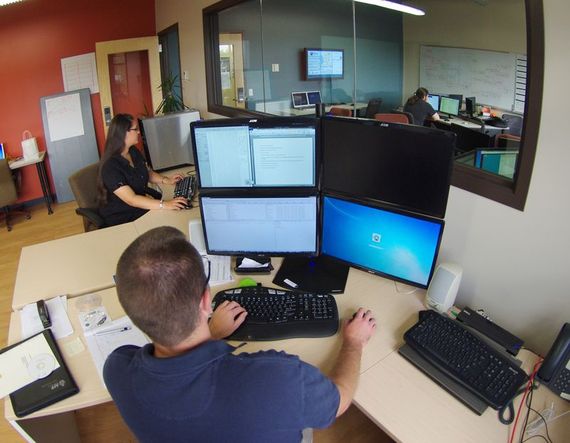Better technology means a more mobile society. Digital devices make life easier, but they also open the door for computer hackers and other cyber criminals. The growing threat of cyber attacks and the increased need for mobile security has led to a boom in the cyber security and digital forensic industries. According to a digital forensics market report from BCC Research, crime labs in the United States performing forensic analysis grew from 300 in 1999 to 475 this year, and publicly-funded labs currently spend more than $1.6 billion per year on forensics investigations. So what is the problem in these booming industries? The answer comes down to keeping up with demand. There simply are not enough trained, qualified individuals to fill open positions.
As society becomes more dependent upon digital information the number of attacks is only going to increase. The best defense we have against these cyber attacks are highly-trained professionals who have learned best practice from industry leaders. For those hoping to pursue a career in this field choosing the right college is the first step toward success. While evaluating colleges or universities there are certain criteria that must be considered:
- Do teachers possess a background that combines real-world experience with academic research and training?
- What resources are available for career development? What kind of experience can students expect once they arrive and begin classes?
- Is the college recognized as a leader in cyber security and digital forensics?
- Are graduates from the college actually landing positions in the digital forensic / cyber security industry?
Industry-Savvy Teachers
The best educators have tangible, real-world experience working in digital forensics and cyber security. An extensive industry background gives them a keen sense for the needs of companies and organizations that will one day hire their students. These professors maintain strong industry connections that also help students find internships to supplement their education, and ultimately can lead to job prospects for the student as graduation nears. It is not enough just to teach the material - professors need to know digital forensics and cyber security industries in-depth to prepare graduates for their future jobs.
Real-World Preparation
Many companies looking to fill their cyber security and digital forensic needs want candidates with at least three to five years of experience, which many students will not have immediately upon graduation. To be positioned for these opportunities, you need an institution that provides hands-on classroom experience combined with intensive internships. Classes like mobile device forensics, digital forensic tool evaluation, anti-forensics and network forensics, and others provide in-depth experience for real-world preparation. If students already know all the ins and outs of their future profession, it will be easier for them to find jobs after graduation.
Industry Recognition
Of course, designations give insight into a college or university's commitment to providing students with only the best education that will make them marketable graduates. One such distinction is the National Center of Digital Forensics Academic Excellence (CDFAE) by the Defense Cyber Crime Center (DC3). DC3 developed the CDFAE program to establish academic best practices for digital forensics practitioners, educators, students and researchers, while increasing the number of qualified professionals able to meet industry needs and fill open positions. This was brought about due to the U.S. Department of Defense projecting a growing cyber security workforce deficit, as well as certain skills necessary for educated professionals to handle a growing number of cyber security threats to both public and private organizations.
Other designations students will want to look for are ones from the National Security Agency (NSA) and the U.S. Department of Homeland Security (DHS). Designations like these show that colleges and universities have the ability to develop leaders to meet high expectations and demands in the digital forensics and cyber security industries.
Post Graduate Success
A great indicator of how well a college prepares its students for their future career is how quickly and where its graduates are actually landing positions post graduation. When you visit and evaluate colleges you should be asking tough questions to those you are interacting with. If you are a career-focused individual, you want to ensure you are getting the best value for your education and you should be considering your college choice an investment in your life long career.
Furthering Your Career Prospects Outside School
Nothing can substitute for good experience, but certifications can help students get a head start in their cyber security or digital forensics careers. Students can explore options and take classes to become a Certified Computer Examiner (CCE) and a GIAC Forensic Analyst (GCFA), among others. Remember, though, that while these certifications can help you get your foot in the door, they are no substitute for high-quality education and experience, which teach the "how" and "why" behind cyber security and digital forensics certifications and work. There are also vendor or tools specific certifications that are typically obtained to help demonstrate expertise in a particular tool.
If students want to prepare for a future in cyber security and digital forensics, it is never too early to figure out how to set a path and achieve goals. More and more, colleges and universities are stepping up to the plate to prepare the digital trailblazers and thought leaders of tomorrow. Recognition from various governmental and industry organizations provide a start in evaluating institutions, but faculty and classes also play a significant role. A great education, combined with professional certificates and hands-on experience, will help to create the well-rounded professionals that the digital forensics and cyber security industries need to shape and protect our increasingly mobile world.
Jonathan Rajewski is the co-director of the Division of Information Technology & Sciences at Champlain College in Burlington, Vermont, a private institution that offers bachelor's and master's degrees in professionally focused programs balanced by an interdisciplinary core curriculum.
